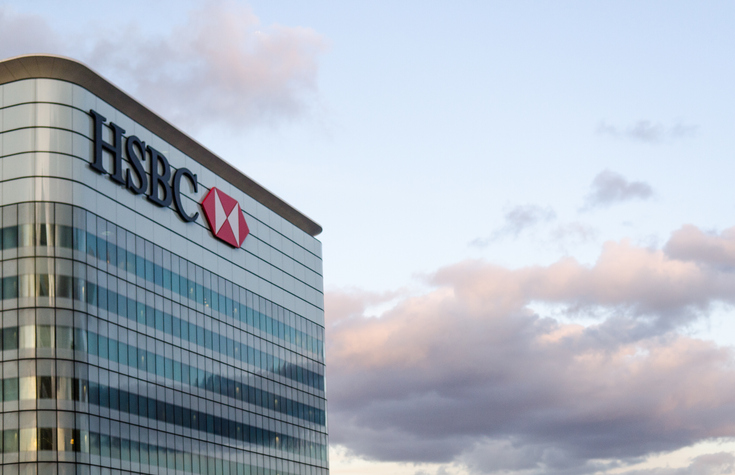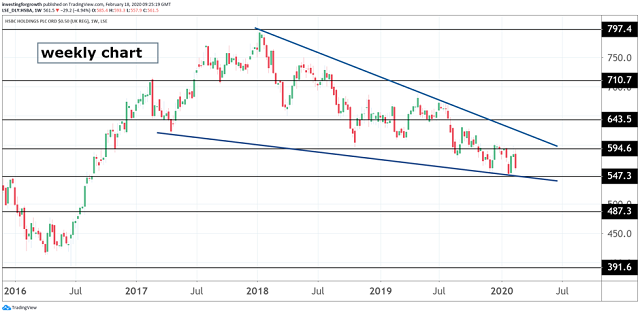HSBC: More questions than answers after these results
Some grim numbers have sparked a share sell-off, but what does our head of markets think?
18th February 2020 09:47
by Richard Hunter from interactive investor
Some grim numbers have sparked a share sell-off, but what does our head of markets think?

HSBC (LSE:HSBA) previous update presaged a torrid fourth quarter which has unfortunately come to pass.
A stronger first half of the year limited some of the overall damage, but rays of light in this full-year update are few and far between. For the fourth quarter alone, the bank fell to a loss of $5.5 billion, hit by a goodwill impairment of $7.3 billion.
The as yet unquantified economic impact of the coronavirus only adds to the previous tribulations of the US/China trade spat, political disruption in Hong Kong and some uncertainty for the UK’s prospects post-Brexit.
This toxic mix is quite apart from the current interest rate environment (net interest margin dropped to 1.58% from 1.66%), with few, if any, signs on the horizon of an uplift.
The full-year result of these factors was a 53% plunge in net profit, underpinned by a 33% drop in pre-tax profit which was significantly shy of market expectations, a suspension of the share buyback programme over 2020 and 2021, a 15% reduction in headcount over the next three years and an anaemic outlook.
Meanwhile, the 11% return on tangible equity target which was implicitly abandoned at the third-quarter stage has been vindicated by a figure of just 8.4%, which compares to a previous reported figure of 8.6%.
The planned overhaul of the banking behemoth in the next few years will result in additional costs which, given the size of the bank, unsurprisingly also run to billions of dollars.

Source: TradingView Past performance is not a guide to future performance
All is not lost, however, even if general malaise prevails at present. HSBC’s famously robust balance sheet remains intact, with a healthy capital cushion of 14.7%. The bank has eked out a swing to positive jaws [compares income versus operating expenses] – even if largely driven by cost control – and the planned scything of $100 billion of risk-weighted assets should improve overall fortunes away from previously capital-intensive businesses.
Despite the disappointing headline numbers, HSBC remains extremely profitable, and actually delivered a decent performance in its core Asian units on the whole, despite the obvious limitations in the period.
Although the share buyback programme has been abandoned for the moment, the dividend does not appear to be at risk, and a yield of 5.3% is a crumb of comfort to investors who have witnessed a 21.5% decline in the share price over the last two years.
For the moment, though, there remain more questions than answers as HSBC looks to overhaul its business in radical fashion. Quite apart from the economic challenges, there remains space at the top for a replacement chief executive, the search for whom is an additional distraction. The bank seems determined to target its unacceptably performing units, but this will take time, courage and capital.
- 10 shares to deliver a £10,000 annual income in 2020
- Take control of your retirement planning with our award-winning, low-cost Self-Invested Personal Pension (SIPP)
Investors have largely lost patience given the scale of this challenge and a share price decline of 11% over the last year compares to a 3% hike for the wider FTSE 100 index.
Another effect of HSBC’s financial misfortunes has been the deterioration of the market consensus which remains rooted at a “sell”, reflecting notions of better value elsewhere in the sector.
These articles are provided for information purposes only. Occasionally, an opinion about whether to buy or sell a specific investment may be provided by third parties. The content is not intended to be a personal recommendation to buy or sell any financial instrument or product, or to adopt any investment strategy as it is not provided based on an assessment of your investing knowledge and experience, your financial situation or your investment objectives. The value of your investments, and the income derived from them, may go down as well as up. You may not get back all the money that you invest. The investments referred to in this article may not be suitable for all investors, and if in doubt, an investor should seek advice from a qualified investment adviser.
Full performance can be found on the company or index summary page on the interactive investor website. Simply click on the company's or index name highlighted in the article.